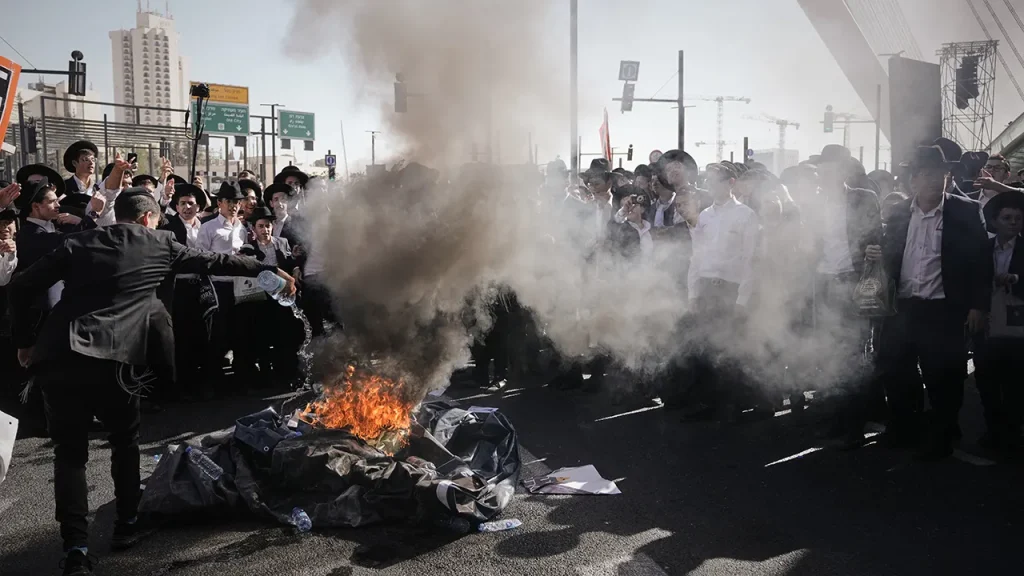Ultra-Orthodox Protest Against Military Service Turns Tense in Jerusalem
In a dramatic display of religious conviction and civil unrest, approximately 200,000 Ultra-Orthodox Jews descended upon Jerusalem last Thursday in one of the largest protests the city has seen in recent years. The demonstration, organized to oppose mandatory military conscription for Haredi men, resulted in dozens of injuries and highlighted the deepening cultural divide in Israeli society during a time of national security challenges. Israel’s emergency service Magen David Adom reported 56 civilian injuries, while police also suffered casualties as some protesters hurled stones at officers attempting to clear blocked highways. The massive gathering effectively paralyzed transportation in and around the capital as demonstrators traveled from Ultra-Orthodox communities throughout the country to make their voices heard on an issue they consider fundamental to their religious identity and way of life.
At the core of this heated controversy lies a decades-old arrangement that has exempted Ultra-Orthodox men engaged in full-time Torah study from Israel’s otherwise mandatory military service. For the Haredi community, this exemption represents more than a mere privilege—it embodies the protection of a sacred lifestyle centered around religious scholarship and insular community values. Many Ultra-Orthodox leaders and their followers view military service not simply as an inconvenience but as an existential threat to their distinctive way of life. They fear that exposure to secular values, mixed-gender environments, and the hierarchical structure of military life would fundamentally undermine the religious foundations upon which their communities are built. From their perspective, the intensive study of religious texts contributes to the spiritual protection of Israel in ways that complement the physical protection provided by the IDF.
The timing of this conflict has proven particularly challenging for Israel, which has been fighting on multiple fronts over the past two years, creating significant military manpower shortages. Last year, Israel’s Supreme Court ruled that the long-standing exemption arrangement was unconstitutional, ordering the government to develop new legislation that would address the inequity perceived by many secular and modern Orthodox Israelis who serve in the military. This ruling has placed enormous pressure on Prime Minister Benjamin Netanyahu’s coalition government, caught between court mandates, national security needs, and the demands of his Ultra-Orthodox political partners. The issue reached a breaking point in July when the Shas and United Torah Judaism parties quit the government, accusing Netanyahu of betraying their religious constituents by not more forcefully protecting the exemption.
The tension visible on Jerusalem’s streets reflects a profound societal divide regarding the nature of Israel’s national identity. For many secular and modern religious Israelis, military service represents not only a security necessity but also a cornerstone of citizenship and shared national responsibility. The sight of thousands protesting against what most citizens consider a fundamental civic duty has provoked strong reactions from opposition figures. Yair Lapid, a prominent opposition leader, pointedly remarked on social media: “If you can march in the streets, you can march in basic training and defend the State of Israel.” Similarly, Benny Gantz condemned incidents of violence against journalists, stating, “There is nothing Jewish about this behavior.” These sentiments capture the frustration many feel watching what they perceive as one segment of society refusing to share in the burden of national defense.
Within the Ultra-Orthodox community itself, perspectives on military service are more nuanced than often portrayed in public discourse. While the leadership and majority remain firmly opposed to conscription, some younger Haredi men have voluntarily joined special religious units within the IDF that accommodate their religious practices. These specialized frameworks provide kosher food to stricter standards, time for prayer and study, and separation from female soldiers. However, community leaders fear that normalizing any form of military service would ultimately erode their distinct identity and religious practices that have been carefully preserved for generations. The protest represents not just opposition to a specific policy but resistance against what many Haredim see as forced assimilation into mainstream Israeli society.
As parliament struggles to craft a compromise acceptable to all parties, the conscription issue has become emblematic of the broader challenges facing Israeli democracy—balancing religious freedom with civic responsibility, maintaining coalition governance during national crisis, and integrating diverse communities with fundamentally different visions of what the Jewish state should be. The scenes from Jerusalem—black-hatted men filling the streets in prayer and protest, confrontations with police, and the capital’s paralyzed infrastructure—visually represent a society grappling with existential questions about its future. With Israel facing external threats requiring national unity and internal divisions threatening governmental stability, the path forward remains uncertain. Whatever solution eventually emerges will need to acknowledge both the legitimate security needs of the state and the deeply held religious convictions of the Ultra-Orthodox community, a balancing act that has eluded Israeli leadership for generations.


